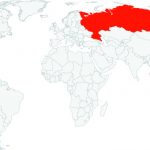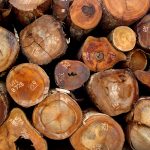
Many of the member states that are pushing to water down the EUDR are direct recipients of illegal wood coming from Russia or Belarus through “friendly actors.”
Earthsight’s January 2025 report showed that the EU had imported over €1.5 billion of illegal Russian and Belarusian birch plywood via third countries since sanctions on these products took effect. Their new research shows that the EU has imported a further €273 million of ‘blood-stained birch’ between November 2024 and April 2025, laundered through China, Kazakhstan, Turkey and Georgia.
Repackaged and relabelled by launderers in these third countries and accompanied with fraudulently issued certificates of origin, the goods are often passed off as being made from trees harvested in those third countries, rather than in Russia or Belarus.
All these third countries have low deforestation rates, meaning they would likely be eligible for ‘no-risk’ status under current EUDR country risk category.
Between February and April this year, Spain, which has not requested EUDR exemptions, was the EU’s top importer of suspect birch plywood, with shipments worth over €15 million in estimated retail value, Earthsight found. Portugal followed with more than €12 million, while Estonia imported nearly €10 million worth, mainly from Kazakhstan. However, Poland – the largest importer between 2022 and 2024 – has since significantly stepped up checks, leading to a sharp drop in imports from February this year. Spain’s wood and furniture association has warned that continued Russian imports threaten the domestic industry, echoing similar concerns raised by producers in Latvia and Poland.
Also reported here: The EU’s €273m Sham – Russian Birch Ply Is Still Flooding Europe! | Wood Central
The investigation shows that Russian plywood is being smuggled en masse into numerous EU member states and that efforts by authorities to clamp down have been woefully inadequate. As a result, illegal blood-stained birch worth over 1.5 billion euros has been sold in Europe since sanctions took effect.
Piecing together information from insider leaks, trade documents and clandestine calls, we reveal the actorsThe investigation shows that Russian plywood is being smuggled en masse into numerous EU member states and that efforts by authorities to clamp down have been woefully inadequate. As a result, illegal blood-stained birch worth over 1.5 billion euros has been sold in Europe since sanctions took effect.
Piecing together information from insider leaks, trade documents and clandestine calls, we reveal the actors at every stage of the supply chain – from the manufacturing giants in Russia, through to the firms laundering their products in China, Kazakhstan and Turkey, and their customers in the EU.
at every stage of the supply chain – from the manufacturing giants in Russia, through to the firms laundering their products in China, Kazakhstan and Turkey, and their customers in the EU.
Kazakhstan has developed and operated its own set of Earth observation satellites since 2015. It consists of both a high-resolution satellite, KazEOSat-1, and a medium-resolution satellite, KazEOSat-2. Since 2018, the imagery these satellites provide has been supplemented by data from Planet.
An investigation by the European Commission has confirmed the circumvention of anti-dumping duties by firms buying plywood from Turkey and Kazakhstan. The investigation found evidence of laundering of finished Russian plywood – a breach of EU sanctions put in place following the Ukraine invasion.
Inspectors also confirmed Turkish and Kazakh firms are using Russian raw materials to make birch ply for sale in Europe. The European Commission investigation found evidence of plywood made in Russia being simply laundered and re-labelled as of Kazakh or Turkish origin, something which should be of interest to authorities tasked with enforcing EU sanctions, both at EU and Member State level. Though not covered by sanctions, these sales are in clear breach of the EU Timber Regulation (EUTR), a law meant to halt illegal wood use in Europe.
Today Earthsight, which submitted evidence to the EU’s investigation, has filed EUTR complaints pertaining to 31 firms across nine member states whose suppliers were confirmed by the EU to be using Russian raw materials.
Poland is the new gateway for Belarussian timber, with the import of timbers (via Kazakhstan) surging. A joint investigation involving the Belarussian Investigative Center, Radio Free Europe, and Polish newspaper Gazeta Wyborcza alleges that Polish imports of timber from the largely deforested Kazakhastan grew from €14 million (pre-war) to more than €68 million last year as part of a €126 million global trade in conflict timber.
Also featured in Belarus evading EU sanctions by importing timber to Poland with false documents, finds investigation | Notes From Poland and Fraud Exposed: Poland Now EU’s Ground Zero for Conflict Timber | Wood Central
The European Commission has disclosed the findings of its anti-circumvention investigation into illegal imports of Russian birch plywood. The findings disclosed to relevant stakeholders show evidence that Russian birch plywood is being imported into the EU market through Kazakhstan and Türkiye to avoid paying anti-dumping duties. As Russian wood products are also subject to sanctions in the EU, the results of this investigation are expected to lead to further action by national authorities and the European Anti-Fraud Office (OLAF).
A cross-border probe, led by ICIJ and first published in March 2023, involved 44 media partners globally and documented how Western environmental auditing firms and governments failed to stop the trade of wood logged in conflict zones.
The findings supported a June investigation from ICIJ partners Paper Trail Media, Der Spiegel, ZDF and others that similarly revealed how Russian timber continued to circumvent the EU’s embargo, making its way into the bloc by routing through countries like China, Turkey, Kazakhstan and Kyrgyzstan.
Timber trade from Belarus has increased six times since the start of the Ukraine conflict amid fears that Azerbaijan is being used to bypass sanctions. Since early 2022, western sanctions on Russian and Belarussian trade have limited the export of pulp, paper and softwood to nine countries – China, Kazakhstan, Belarus, Uzbekistan, Iran, Kyrgyzstan and the United Arab Emirates and Azerbaijan
The European Commission is investigating potential illegal imports of Russian birch plywood products into the European Union. CELEX:32023R1649:EN:TXT.pdf (europa.eu) There has been a significant increase in imports of Russian birch plywood into Turkey and possibly Kazakhstan, and an increase in exports of birch plywood from both countries to the EU—although neither has been a significant producer of birch plywood in the past. The EU banned Russian wood after Russia invaded Ukraine.
Before Russia’s invasion of Ukraine in February 2022, about 80% of all birch plywood globally was produced in Russia, Belarus and Ukraine.
After the fifth package of sanctions imposed on Russia by the EU finally entered into force in July 2022, the import of roundwood and wood products, including birch plywood, from Russia to the EU was banned. However, according to information and statistics obtained from the market, it seems that illegal Russian birch plywood continues to be imported to Europe from third countries.
This is reflected in increased imports of birch plywood from countries such as Kazakhstan and Turkey. Considering the production capacity of Kazakhstan, we can see that the country does not have sufficient birch plywood production to be able to deliver the volumes recorded in the statistics.
Illegal birch plywood travels to the European markets in many ways. The import ban is evaded by transit through a third country, for example. The third countries may also make minor changes to the plywood, after which the country where the changes were made is reported as the products’ country of origin. Another way is to use a false tariff heading so that the product is excluded from sanctions.
Not long after imposing sanctions on wood imports from Russia and Belarus, Europe saw an influx of wood supposedly coming from Kazakhstan and Kyrgyzstan. Authorities say sanctions-busters are increasingly mislabeling wood as Central Asian so they can keep bringing it in to the EU.
Key findings:
Traders are evading European Union sanctions on Russian and Belarussian wood by declaring that it really comes from Central Asia.
Customs in Lithuania and Latvia are scrambling to keep up with the sudden influx of timber with suspect paperwork from Kazakhstan or Kyrgyzstan.
Reporters found several Kyrgyz and Belarusian companies that offered false paperwork so traders could ship banned Belarusian wood to the EU.
NUR-SULTAN. KAZINFORM Kazakhstan has imposed ban on export of certain types of timber to prevent illegal re-export of timber from its territory, Kazinform learned from the Ministry of Finance State Revenue Committee. The ban was imposed by the order of Minister of Industry and Infrastructure Development as of June 7, 2022 No322 «On some issues of regulation of the export types of timber» which entered into force on June 8, 2022
Click here to access the Global Illegal Logging and Associated Trade (ILAT) Risk assessment tool and to download the Forest Trends User Guide describing the functionality of the ILAT Risk Data Tool.
Click here to access the Cattle Data Tool.












